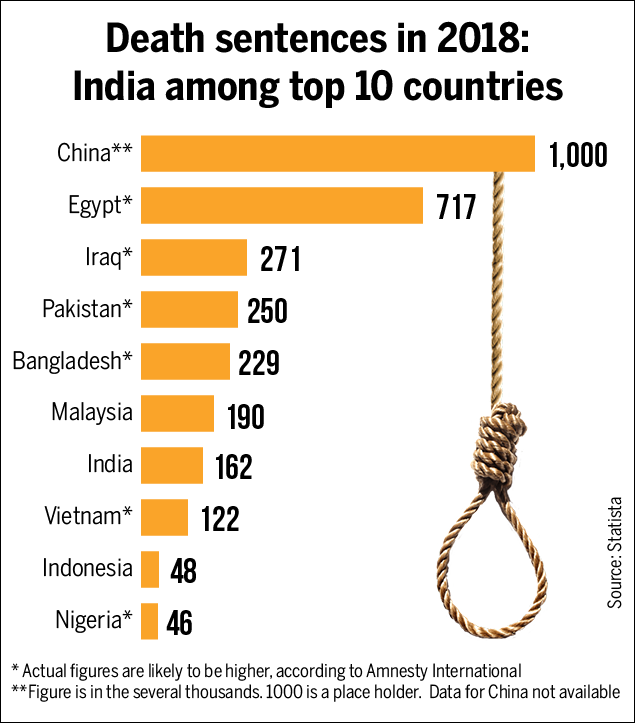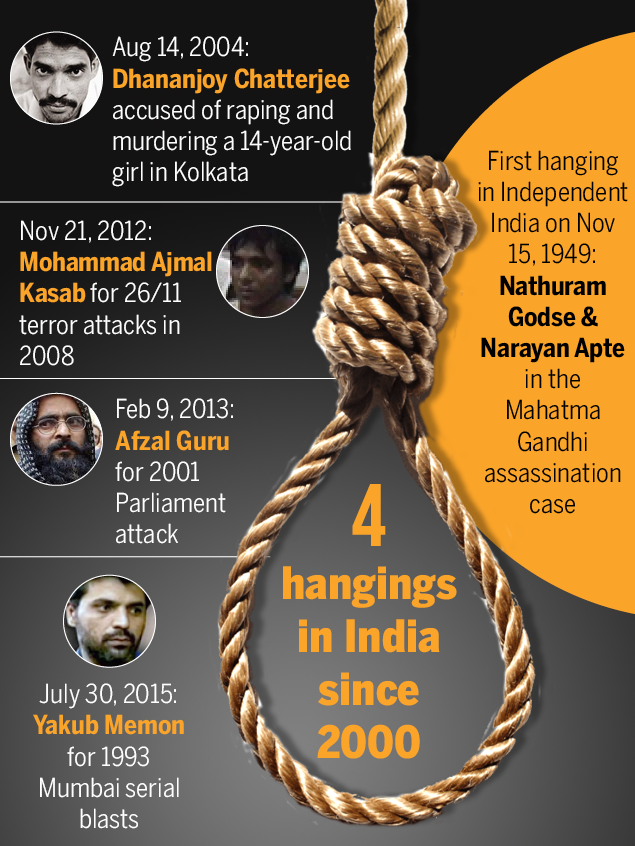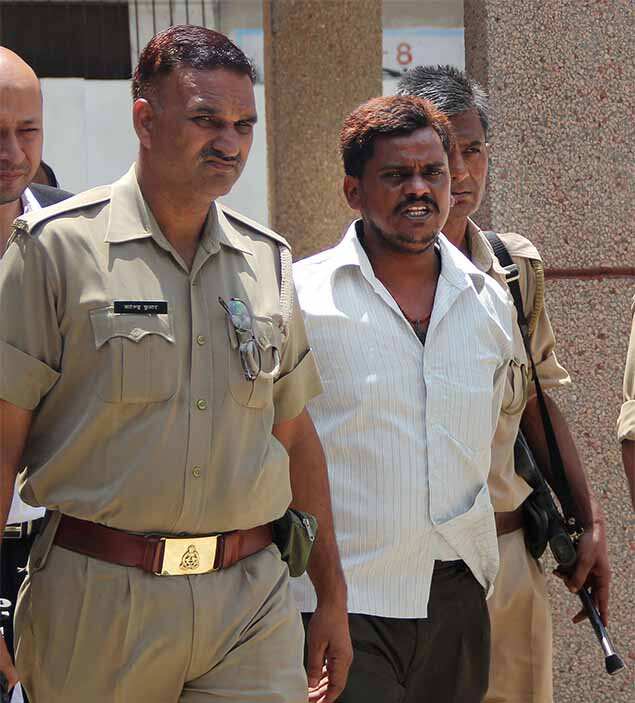 |
| Why is death penalty almost unimplementable in India |
On the one hand, states are framing laws — like Andhra Pradesh's Disha Bill to sentence rapists to death in 21 days — for speedy sentencing — but even those convicted for the most heinous crimes are yet to be hanged. The system has safeguards to ensure the last possible legal option is open to a convict before he faces the noose. But sometimes things fall through the cracks.
It can well be argued that death penalty should be done away with, like it has been in most of the advanced world. But if it exists, and even if the apex court upholds death penalty, then to keep a prisoner waiting on death row forever makes little sense. In India, the only person executed for a heinous crime (not terror) in this century was Dhananjay Chatterjee, who was hanged at Kolkata’s Alipore Central Jail on August 14, 2004.
 |
| Death sentence in 2018 |
In the case of Nirbhaya — the 23-year-old physiotherapy student who was brutally gang raped and murdered on December 16-17, 2012, in a moving bus in Delhi — the woman's parents filed a case seeking speedy execution, but on December 18, 2019, the court adjourned for January 7, 2020, the hearing on the issuance of death warrants against the four convicts. "I have full sympathy with you. I know someone has died but there are their rights too. We are here to listen to you but are also bound by the law," said the judge who pronounced the judgment.
HOW THE PROCESS BEGINS
1. Starts with fast-track
Trial courts (or fast-track courts) handling cases of sexual offences against women and children are bound by deadlines. They need to decide the case within six months after filing of the charge-sheet. But on an average, trial courts take between 1 and 2 years to reach a verdict notwithstanding the day-to-day hearing in cases mandated by Section 309 CrPC.
2. Higher courts
But high courts and the Supreme Court deal with such matters on a case-by-case basis. There is no fixed time-frame; it is up to the chief justice or the presiding judge to take a call.
3. Review plea
After conviction by the Supreme Court, a convict gets 30 days’ time to seek review under Article 137 of the Constitution. Even after a review plea is dismissed, the convict can file a curative petition invoking Article 142 (inherent powers) of the Supreme Court. There is no time-frame within which it has to be filed; but courts have largely accepted six months after dismissal of review plea as the standard.
4. Mercy plea
As a last resort, a convict has right to seek mercy by filing a petition directly with the President. The process provided under Article 72, however, doesn’t provide for any prescribed procedure to deal with such mercy petitions.
5. Leniency
Indian courts and jail administration are generally lenient if there is delay in filing of review, curative or mercy petitions by a convict, recognising that imprisoned persons find it difficult to hire lawyers and prepare petitions.

CASE THAT SHOW HOW PLEAS FOR MERCY PROGRESS
Nithari killings: How Koli escaped the plea at the 11th hour in 2014

Surendra Koli's hanging was fixed for September 2014 but the SC stayed the execution in the middle of the night over a pending review petition
- In 2009, the first death sentence to Koli was awarded by the trial court. Allahabad HC confirmed the death sentence.
- In 2011, SC dismissed the appeal and upheld the death sentence. Koli then filed a mercy petition.
- In 2014, President rejected the mercy petition. The hanging was fixed for September after the trial court issued a black warrant (the final order). However, SC stayed the execution at 2am over Koli’s pending review petition after lawyers appeared for him and got him a reprieve on this ground. SC rejected the review in October.
- In 2015, Koli and an NGO separately moved the Allahabad HC against hanging on the grounds of delay in deciding the mercy petition. The high court commuted death to life citing 2014 SC ruling in Shatrughan Chauhan case. Since then, Koli has been convicted and awarded death sentence in 10 other cases, including one in April 2019. Due to multiple cases and trials and witnesses/victims, justice has been delayed with each case likely to go through the full cycle of appeals and review. Jurisprudence in capital punishment argues that since death is irrevocable, authorities should wait for a convict to exhaust all legal options before carrying out the sentence.
No comments:
Post a Comment